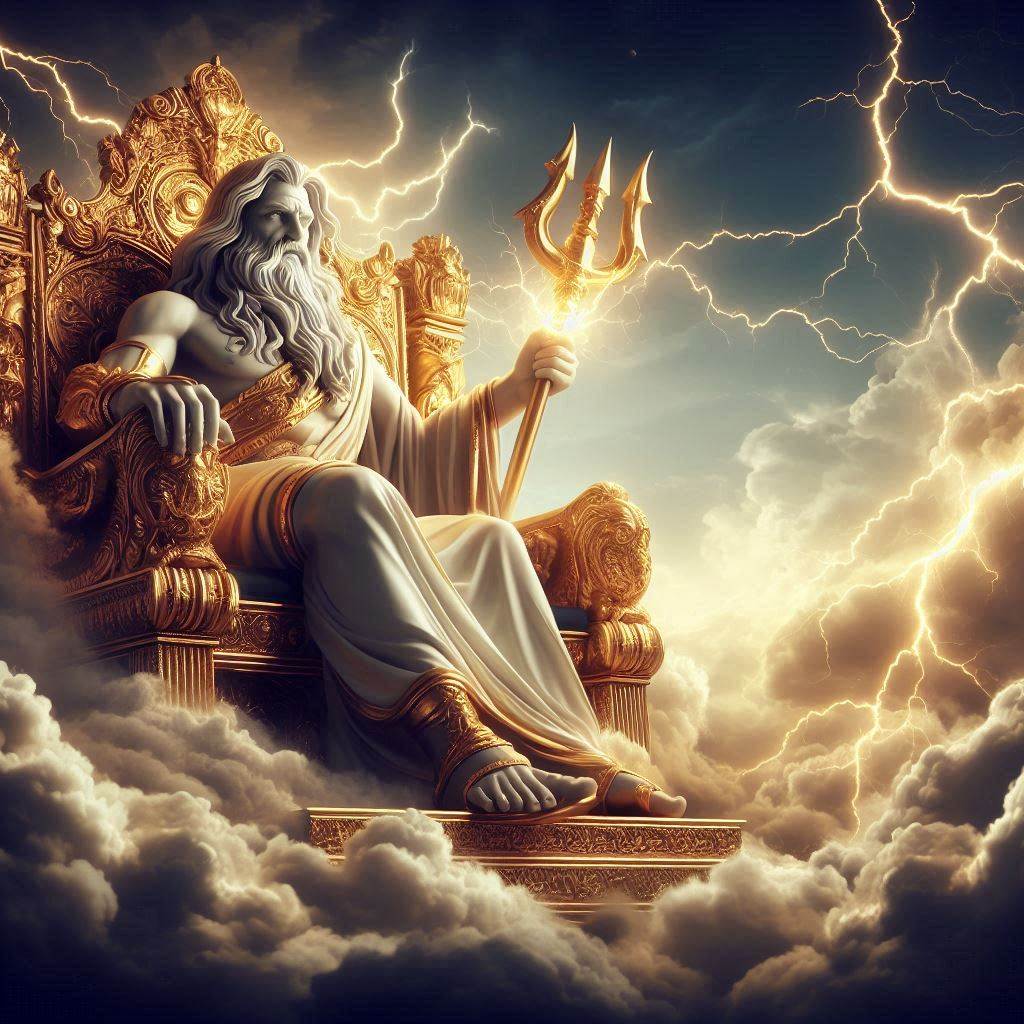Greek mythology is rich with a pantheon of gods and goddesses, each of whom governed various aspects of the natural world, human life, and even the cosmos. The top ten gods in Greek mythology are often considered the most powerful and influential, forming the core of the Twelve Olympians who were believed to reside on Mount Olympus. Here’s a list of the ten most important Greek gods, along with their domains:

1. Zeus
- Domain: King of the Gods, Sky, Thunder, Justice
- Symbol: Thunderbolt, Eagle, Oak tree
- Overview: Zeus is the most powerful of the Greek gods and rules the heavens and the earth. As the king of Mount Olympus, he governs both the divine and human realms, overseeing justice, law, and order. Zeus is also known for his numerous romantic escapades with both goddesses and mortals, resulting in many offspring.
2. Hera
- Domain: Queen of the Gods, Marriage, Family, Fertility
- Symbol: Peacock, Pomegranate, Diadem
- Overview: Hera is the wife and sister of Zeus, and she rules over marriage and family. Despite her position as the queen of the gods, she is often portrayed as vengeful, particularly towards Zeus’s lovers and their children. She is also known for her nurturing role and protection of women during childbirth.
3. Poseidon
- Domain: God of the Sea, Earthquakes, Horses
- Symbol: Trident, Horse, Dolphin
- Overview: Poseidon, brother of Zeus and Hades, is the god of the sea and waters, as well as earthquakes and horses. His power is vast, controlling the oceans and everything within them. Poseidon is often depicted as a volatile god, capable of both creating calm seas and unleashing violent storms.
4. Athena
- Domain: Wisdom, War Strategy, Crafts, Civilization
- Symbol: Owl, Olive tree, Aegis (shield)
- Overview: Athena is the goddess of wisdom, reason, and warfare strategy. Born fully grown and armored from the head of Zeus, she represents the combination of intellect and military prowess. Athena is also associated with handicrafts and weaving, and she is the patron goddess of the city of Athens.
5. Apollo
- Domain: Sun, Music, Prophecy, Healing, Poetry
- Symbol: Lyre, Laurel wreath, Sun chariot
- Overview: Apollo is one of the most important and versatile gods. He is the god of the sun, music, poetry, and prophecy. Known for his beauty and artistic talents, Apollo is also associated with healing and medicine. He is often depicted with a lyre, which he uses to create music, and his oracle at Delphi was one of the most famous in the ancient world.
6. Artemis
- Domain: Moon, Hunting, Wilderness, Childbirth
- Symbol: Bow and arrows, Deer, Moon
- Overview: Artemis is Apollo’s twin sister and the goddess of the hunt, the moon, and wild animals. She is a virgin goddess who fiercely protects her autonomy and is often depicted with a bow and arrow. Artemis is also associated with childbirth and the protection of women in labor.
7. Ares
- Domain: War, Bloodshed, Violence, Courage
- Symbol: Spear, Helmet, Dog, Vulture
- Overview: Ares is the god of war, particularly the violent and chaotic aspects of conflict. Unlike Athena, who represents strategic war, Ares is associated with bloodshed, aggression, and the raw emotions of battle. Though a powerful figure, he was not universally adored and was often disliked by both gods and mortals alike.
8. Demeter
- Domain: Agriculture, Harvest, Fertility
- Symbol: Sheaf of wheat, Cornucopia, Poppy
- Overview: Demeter is the goddess of agriculture, fertility, and the harvest. She is the mother of Persephone, whom Hades abducted to the underworld, causing Demeter to grieve and withdraw from her duties, which led to the seasons of the year. Demeter’s power over the earth’s crops made her essential for the survival of humanity.
9. Hades
- Domain: God of the Underworld, Death, the Afterlife
- Symbol: Cerberus, Bident, Cypress tree, Pomegranate
- Overview: Hades is the god of the underworld, ruling over the realm of the dead. He is often misunderstood as the god of death itself, but his role is to govern the afterlife and ensure that the souls of the dead are properly accounted for. He is also the abductor and husband of Persephone, whom he took to be his queen.
10. Hermes
- Domain: Messenger of the Gods, Commerce, Thieves, Travel
- Symbol: Winged sandals, Caduceus (staff), Tortoise
- Overview: Hermes is the swift and cunning messenger of the gods. He is also the god of commerce, travel, and thievery. Hermes guides the souls of the dead to the underworld and is associated with boundaries, both physical and metaphorical. Known for his intelligence and wit, Hermes is often depicted as a trickster.
Conclusion:
These ten gods are central figures in Greek mythology, each governing significant aspects of both the mortal and divine worlds. From Zeus’s rule over the sky to Hades’s dominion over the underworld, these deities formed the foundation of Greek myth and continue to captivate audiences today. Many other gods and goddesses exist in Greek mythology, but these ten are the most prominent and influential in the mythological pantheon.